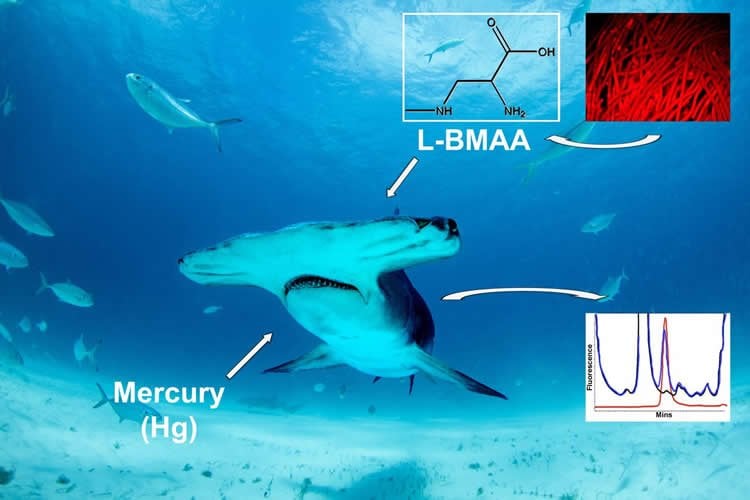Summary: Researchers have found high concentrations of neurotoxins linked to Alzheimer’s disease in the fins and muscles of 10 species of sharks. One of the toxins also has been found in shark fin and shark cartilage supplements.
Source: University of Miami.
UM research team says restricting shark consumption protects human health and shark populations.
In a new study, University of Miami (UM) scientists found high concentrations of toxins linked to neurodegenerative diseases in the fins and muscles of 10 species of sharks. The research team suggests that restricting consumption of sharks can have positive health benefits for consumers and for shark conservation, since several of the sharks analyzed in the study are threatened with extinction due to overfishing.
Fins and muscle tissue samples were collected from 10 shark species found in the Atlantic and Pacific Oceans for concentrations of two toxins–mercury and β-N-methylamino-L-alanine (BMAA). “Recent studies have linked BMAA to neurodegenerative diseases such as Alzheimer’s disease and amyotrophic lateral sclerosis (ALS),” said Deborah Mash, Professor of Neurology and senior author of the study.
Researchers at the UM Rosenstiel School of Marine and Atmospheric Science and UM Miller School of Medicine detected concentrations of mercury and BMAA in the fins and muscles of all shark species at levels that may pose a threat to human health. While both mercury and BMAA by themselves pose a health risk, together they may also have synergistic toxic impacts.
“Since sharks are predators, living higher up in the food web, their tissues tend to accumulate and concentrate toxins, which may not only pose a threat to shark health, but also put human consumers of shark parts at a health risk,” said the study’s lead author Neil Hammerschlag, a research assistant professor at the UM Rosenstiel School and UM Abess Center for Ecosystem Science and Policy.
Shark products including shark fins, cartilage and meat are widely consumed in Asia and globally in Asian communities, as a delicacy and as a source of traditional Chinese medicine. In addition, dietary supplements containing shark cartilage are consumed globally.

Recently scientists have found BMAA in shark fins and shark cartilage supplements. The neurotoxic methyl mercury has been known to bioaccumulate in sharks over their long lifespans.
About 16 percent of the world’s shark species are threatened with extinction. The shark species sampled in this study range in threat status from least concern (bonnethead shark) to endangered (great hammerhead) by the International Union for Conservation of Nature (IUCN).
“Our results suggest that humans who consume shark parts may be at a risk for developing neurological diseases.” said Mash.
“People should be aware and consider restricting consumption of shark parts. Limiting the consumption of shark parts will have positive health benefits for consumers and positive conservation outcomes for sharks, many of which are threatened with extinction due in part to the growing high demand for shark fin soup and, to a lesser extent, for shark meat and cartilage products.” said Hammerschlag.
The study’s coauthors include: Neil Hammerschlag; David A. Davis, Kiyo Mondo, Matthew S. Seely, and Deborah C. Mash from the UM Miller School of Medicine’s Department of Neurology; Susan J. Murch and William Broc Glover from the University of British Columbia; and Timothy Divoll and David C. Evers from the Biodiversity Research Institute in Maine.
Funding: The Herbert W. Hoover Foundation provided the funding for this study.
Source: Reto Caluori – University of Miami
Image Source: This NeuroscienceNews.com image is credited to Neil Hammerschlag, Ph.D. Graphics: University of Miami Miller School of Medicine.
Original Research: Abstract for “Cyanobacterial Neurotoxin BMAA and Mercury in Sharks” by Neil Hammerschlag, David A. Davis, Kiyo Mondo, Matthew S. Seely, Susan J. Murch, William Broc Glover, Timothy Divoll, David C. Evers and Deborah C. Mash in Toxins. Published online August 16 2016 doi:10.3390/toxins8080238
[cbtabs][cbtab title=”MLA”]University of Miami. “Shark Fins and Meat Contain High Levels of Neurotoxins Associated With Alzheimer’s.” NeuroscienceNews. NeuroscienceNews, 29 August 2016.
<https://neurosciencenews.com/alzheimers-oxins-shark-meat-4926/>.[/cbtab][cbtab title=”APA”]University of Miami. (2016, August 29). Shark Fins and Meat Contain High Levels of Neurotoxins Associated With Alzheimer’s. NeuroscienceNews. Retrieved August 29, 2016 from https://neurosciencenews.com/alzheimers-oxins-shark-meat-4926/[/cbtab][cbtab title=”Chicago”]University of Miami. “Shark Fins and Meat Contain High Levels of Neurotoxins Associated With Alzheimer’s.” https://neurosciencenews.com/alzheimers-oxins-shark-meat-4926/ (accessed August 29, 2016).[/cbtab][/cbtabs]
Abstract
Cyanobacterial Neurotoxin BMAA and Mercury in Sharks
Sharks have greater risk for bioaccumulation of marine toxins and mercury (Hg), because they are long-lived predators. Shark fins and cartilage also contain β-N-methylamino-l-alanine (BMAA), a ubiquitous cyanobacterial toxin linked to neurodegenerative diseases. Today, a significant number of shark species have found their way onto the International Union for Conservation of Nature (IUCN) Red List of Threatened Species. Many species of large sharks are threatened with extinction due in part to the growing high demand for shark fin soup and, to a lesser extent, for shark meat and cartilage products. Recent studies suggest that the consumption of shark parts may be a route to human exposure of marine toxins. Here, we investigated BMAA and Hg concentrations in fins and muscles sampled in ten species of sharks from the South Atlantic and Pacific Oceans. BMAA was detected in all shark species with only seven of the 55 samples analyzed testing below the limit of detection of the assay. Hg concentrations measured in fins and muscle samples from the 10 species ranged from 0.05 to 13.23 ng/mg. These analytical test results suggest restricting human consumption of shark meat and fins due to the high frequency and co-occurrence of two synergistic environmental neurotoxic compounds.
“Cyanobacterial Neurotoxin BMAA and Mercury in Sharks” by Neil Hammerschlag, David A. Davis, Kiyo Mondo, Matthew S. Seely, Susan J. Murch, William Broc Glover, Timothy Divoll, David C. Evers and Deborah C. Mash in Toxins. Published online August 16 2016 doi:10.3390/toxins8080238






